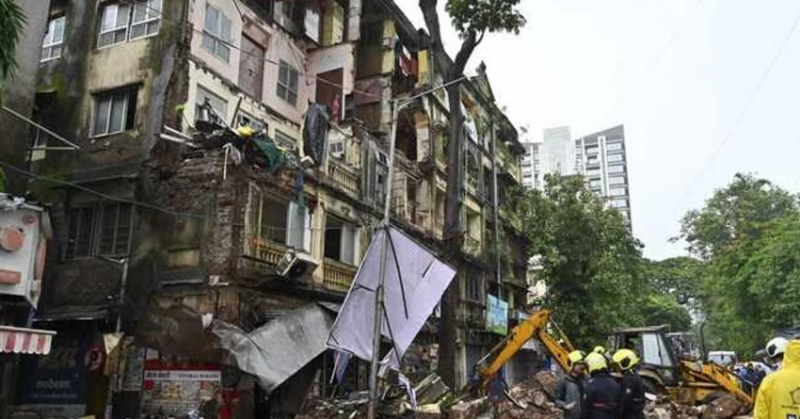
Mumbai: On Saturday, Mumbai faced intense monsoon rains that resulted in the partial collapse of a residential building in the Grant Road area. The incident, which occurred around 11 a.m., tragically led to the death of a woman and left 13 others injured. The affected building, Rubina Manzil, is a four-storey structure situated near Grant Road Railway Station.
The Brihanmumbai Municipal Corporation (BMC) reported that the collapse affected the balcony and slab sections of the second and third floors, as well as parts of the upper floors. Several sections of the building were left precariously hanging. Emergency services, including the Mumbai Fire Brigade, police, and ambulances, promptly arrived at the scene to assist. They managed to rescue seven to eight residents who were trapped on the top floor. Despite their efforts, one woman was pronounced dead at a local hospital, while the other injured individuals are receiving medical care.
Mumbai's monsoon season, running from June to September, is essential for replenishing the city’s groundwater. However, it also brings significant challenges, including damage and disruption. The ongoing heavy rains have severely impacted public transport services in Mumbai, causing widespread inconvenience for commuters.
Tulsi Lake Overflows
In a related development, the heavy rains have caused Tulsi Lake, a major source of drinking water for Mumbai, to overflow. Located within the Sanjay Gandhi National Park (SGNP), Tulsi Lake began overflowing at 8:30 a.m. on Saturday. This is a positive outcome given the recent water shortages in the city.
Tulsi Lake, with a storage capacity of 804.6 crore liters, is the smallest of Mumbai’s seven primary reservoirs but is crucial for the city’s water supply, providing approximately 1.8 crore liters daily. The overflow is beneficial as it helps replenish other reservoirs like Vihar Lake, also located within SGNP.
Established in 1879 at a cost of Rs 40 lakh, Tulsi Lake has a significant historical and practical role in Mumbai's water supply system. The city relies on seven main reservoirs—Bhatsa, Upper Vaitarna, Middle Vaitarna, Tansa, Modak Sagar, Vihar, and Tulsi—to meet its daily water needs, which amount to around 3,800 million liters.
Recent Updates:
Goods Train Derails Near Valsad in Gujarat, No Injuries Reported
NCRTC Develops Over 8,000 Parking Spaces at RRTS Stations
Heavy Rainfall Causes Devastation in Uttarakhand's Kumaon and Garhwal Regions